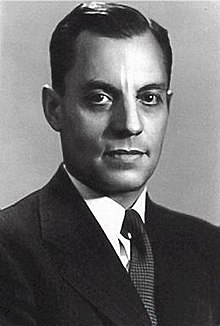Ancel Keys
| Ancel Keys | |
|---|---|

Keys in 1945
|
|
| Born | Ancel Benjamin Keys January 26, 1904 Colorado Springs, Colorado |
| Died | November 20, 2004 (aged 100) Minneapolis, Minnesota |
| Residence | United States |
| Citizenship | United States |
| Nationality | American |
| Fields | Human Nutrition, Public Health, epidemiology |
| Institutions | University of Minnesota |
| Alma mater | University of California at Berkeley, Scripps Institution of Oceanography, Kings College, Cambridge |
| Academic advisors | August Krogh |
| Known for | Human Nutrition, K-ration, Mediterranean diet |
| Spouse | Margaret Keys |
Ancel Benjamin Keys (January 26, 1904 – November 20, 2004) was an American physiologist who studied the influence of diet on health. In particular, he hypothesized that dietary saturated fat causes cardiovascular heart disease and should be avoided.
Keys studied starvation in men and published The Biology of Human Starvation (1950), which remains the only source of its kind. He examined the epidemiology of cardiovascular disease (CVD) and was responsible for two famous diets: K-rations, formulated as balanced meals for combat soldiers in World War II, and the Mediterranean diet, which he popularized with his wife Margaret. Science, diet, and health were central themes in his professional and private lives.
Ancel Keys was born in Colorado Springs in 1904 to Benjamin Pious Keys (1883-1961) and Carolyn Emma Chaney (1885-1960), the sister of Lon Chaney. In 1906 they moved to San Francisco before the 1906 San Francisco earthquake struck. Shortly after the disaster, his family relocated to Berkeley where he grew up. His intellect was well-known ever since a young age. Lewis Terman, a noted psychologist and inventor of the Stanford-Binet IQ Test, identified Keys as intellectually "gifted". During his youth, he left high school to pursue odd jobs, such as shoveling bat guano in Arizona, working as a powder monkey in a Colorado mine, working in a lumber camp, and even working as a crewmember on a ship to China. He eventually finished his secondary education and was admitted to the University of California at Berkeley in 1922.
At the University of California, Berkeley, Keys initially studied chemistry, but was dissatisfied and took some time off to work as an oiler aboard the S.S. President Wilson (1st), which traveled to China. He then returned to Berkeley, switched majors, and graduated with a B.A. in economics and political science (1925) and M.S. in zoology (1928). For a brief time, he took up a job as a management trainee at Woolworth's, but returned to his studies at Scripps Institution of Oceanography in La Jolla on a fellowship. In 1930 he received his Ph.D. in oceanography and biology from UC Berkeley. He was then awarded a National Research Council fellowship that took him to Copenhagen, Denmark to study under August Krogh at the Zoophysiological Laboratory for two years. During his studies with Krogh, he studied fish physiology and contributed numerous papers on the subject. Once his fellowship ended, he went to Cambridge but took some time off to teach at Harvard University, after which he returned to Cambridge and earned a second Ph.D. in physiology (1936).
...
Wikipedia
